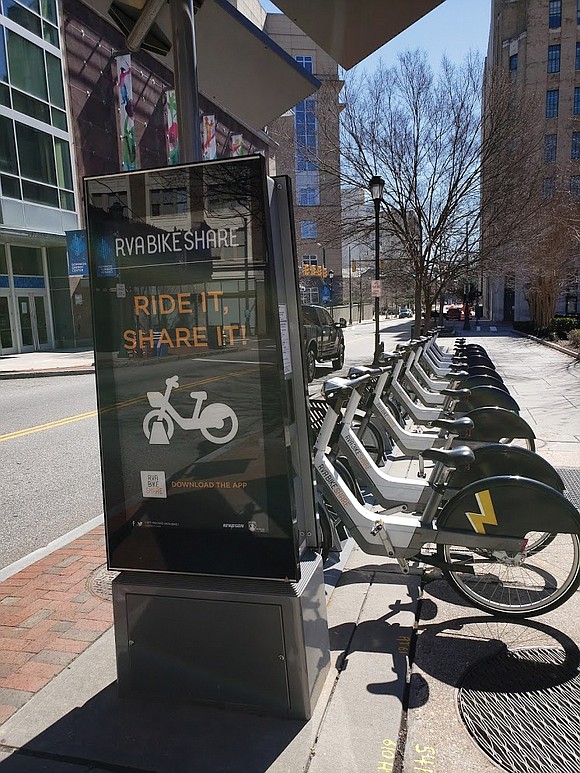City going all in for electric bikes
Jeremy M. Lazarus | 3/29/2019, 6 a.m.
City Hall is trying to turn around its failing bike share program by adding battery-powered bikes to make it easier for riders to travel longer distances and get up the city’s hills.
The first 20 electric bikes with a yellow lightning bolt logo were added to the rental fleet last weekend, although the locations were not identified. The PedElec system allows riders to cycle at 12 mph with the battery-powered assist.
It is the initial step toward converting all 220 bikes at the current 16 docking stations to PedElec bikes. The city’s goal is to have all stations outfitted for battery charging and with PedElec bikes by May.
But the big question is whether the conversion to electric bikes will make a difference, given the current lack of use and widespread complaints about inconvenient docking stations for pickup and return of the rented bikes.
Richmond Bike Share reported that, as of March 26, only 377 individuals are active members of the program, meaning they paid for monthly or yearly passes, and just 681 people were occasional users. That is evidence of how sharply interest has waned.
When the program launched in August 2017, Richmond Bike Share and its operator, Canada-based Bewegen, boasted that 1,000 people had tried the bikes in the first two weeks, and at its peak, the system reported 7,611 people had registered.
The lack of interest also is reflected in the meager revenue the program has generated.
In the first 15 months, Richmond Bike Share generated $59,800 from rider payments. Bike rental rates start at $1.75 for a one-time, one-way ride and run $6 a day, $18 a month and $96 a year, with payments made via a mobile phone app.
Total revenue for the August 2017 to November 2018 period was $83,000, including advertising at and sponsorships of docking stations.
That compares to a yearly cost of $393,000 to operate and maintain the bikes and stations, according to Jakob Helmboldt, the city’s pedestrian, bicycle and trails coordinator who oversees the operation that Bewegen and its partner, Corps Logisics, run under the Richmond Bike Share name.
At this point, a federal grant of $1.06 million is picking up the difference, but that funding is expected to run out around December, Mr. Helmboldt told City Council in January. At that point, taxpayers will be on the hook to subsidize any shortfall.
Like other cities, Richmond was attracted to the bike share program because the federal government was picking up most of the initial cost. The city put up $280,000, while the federal government provided the $1.06 million to help pay for installation and the first 2½ years of operating costs.
City officials called bike sharing a system that could add a new, healthy transportation option for visitors to see the sights and residents to commute to work.
The system was installed at a time when other cities already were moving toward dockless bicycles. By June, Richmonders will be able to rent dockless scooters as another option for getting around.
The impending arrival of the electric scooters comes as the city prepares to invest another $1.5 million in federal funds for an additional 20 docking stations and 220 additional bikes, all electric powered. Mr. Helmboldt told City Council that the new stations would fill in gaps in the system, but the increase in bikes and docking stations also will sharply hike the subsidy the city will have to provide, unless Richmond scraps the program like Baltimore and Seattle have done.
As spring begins, it is unclear when the new bike stations will be rolled out.






